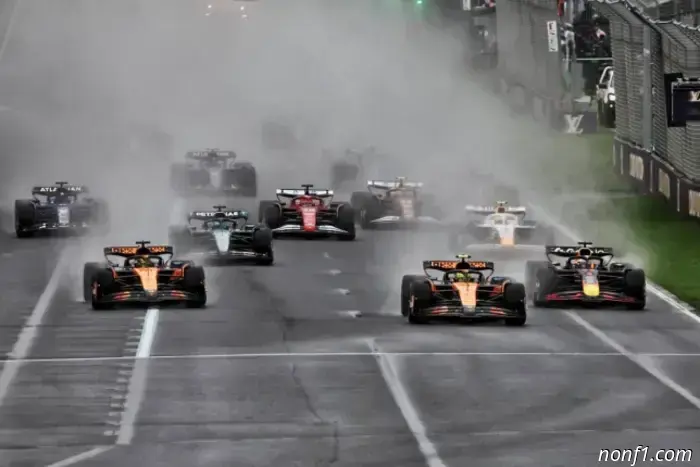
Why there won't be races on artificially watered tracks
We are used to the most exciting races taking place in changing weather or simply in the rain – the meteorological factor inevitably affects the course of the battle on the track, making it unpredictable. Moreover, it gives drivers the opportunity to fully demonstrate their skill and deliver impressive results even behind the wheel of not-the-fastest cars.
Since there are circuits in the world equipped with artificial watering systems, BBC Sport correspondent Andrew Benson, who has been working in the paddock for over 30 years, was asked by fans whether we will ever see races in which such systems are used.
And here is what he replied…
When Bernie Ecclestone, the former head of Formula 1 management, first floated the idea about fifteen years ago, the reaction was mixed – a combination of horror and ridicule.
However, you could never be sure how seriously Ecclestone was speaking. In any case, the idea was gradually forgotten.
There are several cornerstones in Formula 1 on which its whole ideology is built, and it makes sense to remind people of them.
First and foremost there is a general belief that the rules should be changed every few years. This is usually done to address various problems that have arisen.
For example, the decision to switch to the new technical regulations that will come into force in 2026 was taken to attract more car manufacturers to Formula 1, because the existing hybrid power units were considered too complex, too expensive, and therefore could not find applications outside motorsport.
At that time there was hope that Audi and Porsche would join the world championship, but ultimately only Audi did.
The new technical regulations for the chassis were introduced because the cars needed to be adapted to next-generation engines so that they could operate as efficiently as possible. In addition, the rules that brought ground effect back to Formula 1 in 2022 did not deliver the expected results – the races did not become more interesting, while the cars had to be fitted with overly stiff suspension and suffered from inherent balance problems.
It is important to make a significant caveat: it is considered crucial that Formula 1 preserve its original nature, and various artificial schemes, even if one has to accept them, are seen as a necessary evil. They must be limited as much as possible so as not to damage the essence of motorsport.
DRS, which aids overtaking, and the electric systems that will replace it next year, designed to provide extra boost during overtakes, are a good example. Nobody likes them, but it is believed they are necessary to at least make overtaking possible in conditions where a factor such as effective aerodynamics dominates.
In this context, it is hard to imagine that Formula 1 could make a collective decision allowing the use of artificial track-watering systems. Moreover, rainy races already pose plenty of problems related to poor visibility, safety, and so on.

Other articles
 REC: The finale of the 2026 season will be the "500 versts MRW" race.
The organizers of the Russian Endurance Racing Series have decided to change the format of at least one race of next season...
REC: The finale of the 2026 season will be the "500 versts MRW" race.
The organizers of the Russian Endurance Racing Series have decided to change the format of at least one race of next season...
 The FIA will, for the first time, combine real and virtual races.
The FIA has decided to combine real races with virtual ones, and the first such experiment will take place next month during the Swedish round of the Karting World Championship...
The FIA will, for the first time, combine real and virtual races.
The FIA has decided to combine real races with virtual ones, and the first such experiment will take place next month during the Swedish round of the Karting World Championship...
 Russell: It makes no difference to me who is driving the second car.
In 2025, George Russell is comfortably ahead of Lewis Hamilton, his former teammate, who this year is racing for Ferrari. And it was precisely because of him that he once had to seek the help of a psychologist.
Russell: It makes no difference to me who is driving the second car.
In 2025, George Russell is comfortably ahead of Lewis Hamilton, his former teammate, who this year is racing for Ferrari. And it was precisely because of him that he once had to seek the help of a psychologist.
 A grandstand named after Oscar Piastri will appear at Albert Park.
Next year the Oscar Piastri Grandstand will make its debut at the Australian Grand Prix — the McLaren driver said this in a video message to fans...
A grandstand named after Oscar Piastri will appear at Albert Park.
Next year the Oscar Piastri Grandstand will make its debut at the Australian Grand Prix — the McLaren driver said this in a video message to fans...
Why there won't be races on artificially watered tracks
The idea of using artificial track-watering systems at races was even proposed by Bernie Ecclestone, but Formula 1 will never go for it, and here's why...
